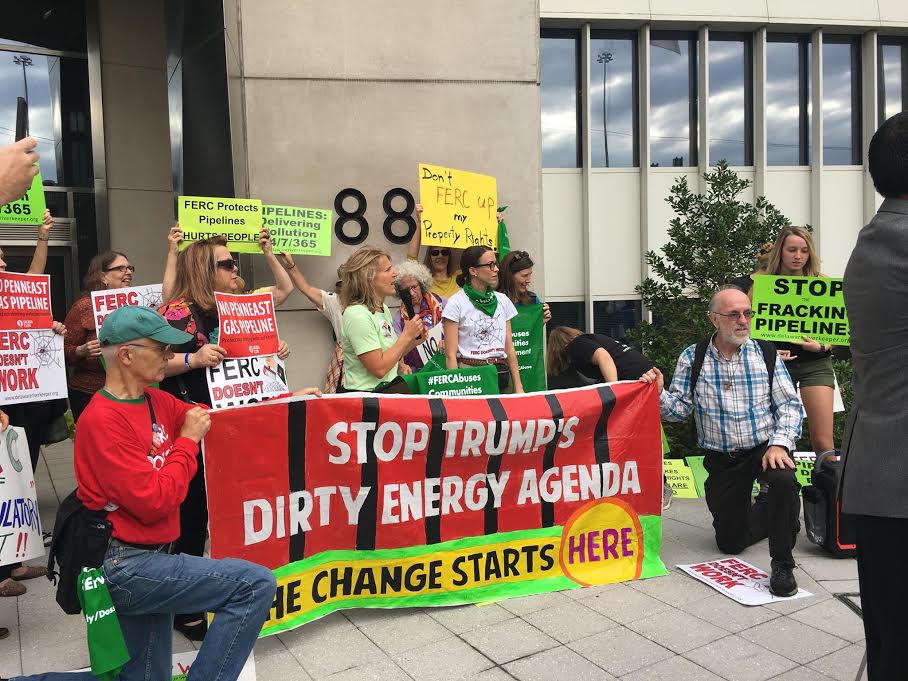Even though their quorum has been restored, and the two final nominees will be approved any day, we've also scored some important victories. For one, on Aug. 22, according to an activist group in Virginia, "the United States Court of Appeals for the D.C. Circuit issued a landmark decision, vacating FERC’s approval of the Sabal Trail Pipeline in Florida. The court determined that FERC is required to consider the foreseeable effects of developing gas pipelines and that those effects include the production of greenhouse gases from methane. This decision is a potential game changer for the Mountain Valley and Atlantic Coast Pipelines, because it is estimated that together they will produce greenhouse gases equivalent to that produced by 45 coal-fired plants or 158 million metric tons per year. In fact, these two pipelines alone would more than double Virginia’s carbon footprint." (More details here.) This is huge, since FERC always claims it has no mandate to consider global warming impacts of the projects it approves.
Then, in what the group calls a "stunning reversal," on Sept. 7 the West Virginia DEP withdrew its earlier approval of a water quality permit required for the Mountain Valley pipeline to proceed. It gave no reason for this extraordinary action, saying only that it needed to “reevaluate the complete application.”
And, the Williams company challenged the NY Department of Environmental Conservation's denial last year of the water quality permit for the $1 billion Constitution Pipeline and lost in court.
Finally, the NC Dept. of Environmental Quality in mid-September announced a minimum several-month delay in approving a permit for the Atlantic Coast pipeline, which would go from West Virginia through Virginia and North Carolina. Maybe it had something to do with a two-week fast undertaken by Greg Yost, a fellow BXEer, in front of the DEQ headquarters. In any case, pipeline opponents all over the country are revved up to keep fighting -- and winning as many battles as possible in hopes of not losing the war.
=============================================================
Below is the op-ed published last week in the New Haven Register, in case you haven't seen it elsewhere:
My brother is a denier of human impact on climate change and I’m a climate activist. He thinks the Republican governors of Texas and Florida, Greg Abbott and Rick Scott, respectively, provided great business-like leadership in organizing their states’ responses to hurricanes Harvey and Irma; I think they’re criminals who contributed to the disaster by denying the human impact on climate change and, at least in Scott’s case, forbidding state employees to even use the term “climate change.”
My brother thinks these unprecedented storms – Harvey for dropping the most rain ever in one event on the U.S., Irma for being the most powerful Atlantic hurricane ever – are just random events, and furthermore says there haven’t been many hurricanes lately, especially not any to hit Florida in the past several years. I think these super storms are exactly what climate scientists have been predicting will be the result of global warming, as warmer ocean water generates stronger – not necessarily more – hurricanes, and warmer air holds more moisture. I guess he also doesn’t count super-powerful hurricanes and cyclones that have hit other parts of the world in recent years, like the Philippines.
He agrees with Republican politicians who say it’s wrong to “politicize” the disasters by talking about climate change. I say climate disruption is about physics, not politics, and the stronger storms, massive flooding, season-long forest fires and other disasters we see on a regular basis are not influenced by what politicians say. All these events could, however, be influenced by what we do – or don’t do.
Another problem is that the media almost never mentioned the climate connection in their 24/7 coverage of the storms. A report from the watchdog group Public Citizen looked at a full week’s worth of coverage of Harvey from 18 outlets and found that only four included any significant reporting on climate. Rather than “politicizing” the issue, these four just reported what’s actually happening. The lack of coverage – like the governor’s edict not to mention the words “climate change” – reminds me of the small child who covers her eyes and thinks no one can see her. Climate disruption is the elephant in the room, whether we choose to see it or not.
I long for the days when concern for the climate was a bipartisan issue. Remember that TV ad back in 2008 with Nancy Pelosi and Newt Gingrich sitting on a couch together, agreeing on the need for action? And in other parts of the world it’s just an everyday topic of conversation. On my once in a lifetime trip to the Alps this summer, a guide pointed to the glacier in front of us and noted that it has shrunk drastically in the past 20 years “due to global warming.”
Climate scientists say the atmosphere should hold no more than 350 parts per million (ppm) of carbon dioxide if we want to avoid fundamental changes to our earth systems. Pre-industrial levels were at 280 ppm, and we’re now at 407 ppm. So we have our work cut out for us.
Kevin Trenberth, a senior scientist at the National Center for Atmospheric Research in Boulder, Colorado, has a good way of explaining it. In an article in the Atlantic, he said, “…a storm like Harvey could have happened even if there was no climate change.” But, he added, “The human contribution can be up to 30 percent or so of the total rainfall coming out of the storm. It may have been a strong storm, and it may have caused a lot of problems anyway—but [human-caused climate change] amplifies the damage considerably.”
So, I say to my brother, “I’ll agree that climate change isn’t causing all the hurricanes if you’ll agree that climate change does play a part.” Deal?

 RSS Feed
RSS Feed
